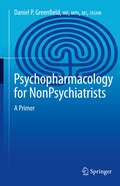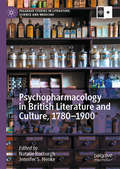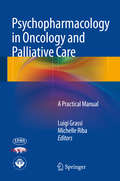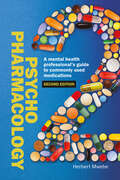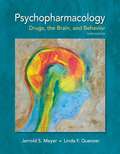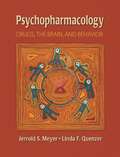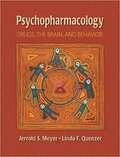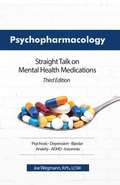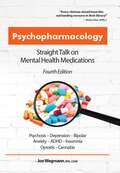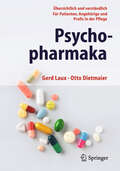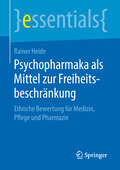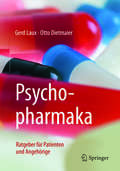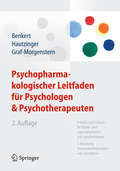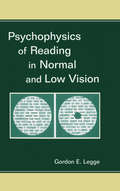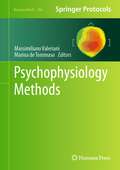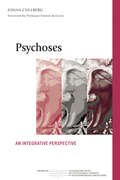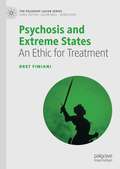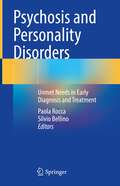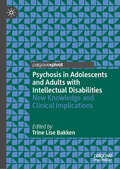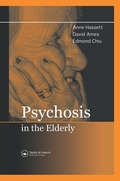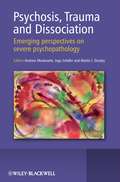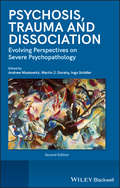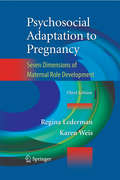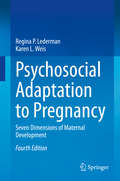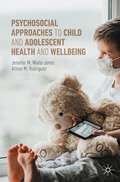- Table View
- List View
Psychopharmacology for Nonpsychiatrists: A Primer
by Daniel P. GreenfieldThis unique, easy-to-read title offers a concise, practical guide to psychopharmacology and psychopharmacotherapy. Designed for a wide range of practitioners and trainees in general and mental healthcare, this invaluable primer provides foundational information for those who wish to cultivate a deeper understanding of the often-mysterious psychopharmacology medication family. Unlike other books on this topic, the primer positions psychopharmacology within the larger context of psychiatric and psychological treatment and also discusses the variety of therapeutic and somatic techniques available to providers and their patients. Further, since many patients with psychiatric conditions unfortunately find themselves interacting with the justice system, the author offers useful considerations related to the intersection of mental health and the law.The primer consists of 13 chapters and is organized in four parts: Part 1 covers essentials of pharmacology and psychopharmacology, outlining the basic principles of pharmacology, psychopharmacology, and psychopharmacotherapy. Part 2 addresses therapies that may involve psychopharmacology/ psychopharmacotherapy, providing a succinct overview of selected and representative types of psychotherapy and counseling in contemporary psychiatry and psychology. Part 3 discusses forensic and legal applications of psychopharmacology/ psychopharmacotherapy, drawing on the author’s long experience in various aspects of forensic psychiatry. Part 4 consists of one final chapter, titled “Synthesis and Conclusions.” This chapter pulls together the most salient points of the book to assist the reader in the practical psychopharmacotherapeutic treatment of patients/clients.A timely and invaluable contribution to the literature, Psychopharmacology for Non-Psychiatrists: A Primer will be of great benefit as a user-friendly resource for professionals or as an exam-preparation book for medical students and trainees in a wide range of mental health fields. Specifically, the primer will be of great interest to primary care physicians, nurse practitioners, physician assistants, counselors, therapists, non-psychiatric physicians and dentists whose practices involve psychopharmacotherapy, naturopaths, homeopaths, physical therapists, occupational therapists, and speech/language therapists. Legal professionals and others who are not themselves healthcare professionals, but who interact with healthcare professionals, also will find the primer a handy resource.
Psychopharmacology in British Literature and Culture, 1780–1900 (Palgrave Studies in Literature, Science and Medicine)
by Natalie Roxburgh Jennifer S. HenkeThis collection of essays examines the way psychoactive substances are described and discussed within late eighteenth- and nineteenth-century British literary and cultural texts. Covering several genres, such as novels, poetry, autobiography and non-fiction, individual essays provide insights on eighteenth- and nineteenth-century understandings of drug effects of opium, alcohol and many other plant-based substances. Contributors consider both contemporary and recent medical knowledge in order to contextualise and illuminate understandings of how drugs were utilised as stimulants, as relaxants, for pleasure, as pain relievers and for other purposes. Chapters also examine the novelty of experimentations of drugs in conversation with the way literary texts incorporate them, highlighting the importance of literary and cultural texts for addressing ethical questions.
Psychopharmacology in Oncology and Palliative Care
by Luigi Grassi Michelle RibaThis practical manual presents the main drugs and protocols currently used in the psychopharmacological treatment of psychiatric disorders in cancer and palliative care settings and explores the principal issues involved in such treatment. Significant clinical challenges encountered in the psychopharmacological management of various psychiatric conditions are discussed, covering aspects such as side-effects and drug-drug interactions. Attention is also paid to the emerging theme of adjuvant use of psychotropic drugs for the treatment of symptoms or syndromes not primarily related to psychiatric disorders. In addition, practical suggestions are provided for dealing with special populations, including children and the elderly. The book is designed to be easy to read and to reference, with helpful concise tables and boxes. The authors include some of the most renowned clinicians working in the field of psycho-oncology.
Psychopharmacology: A mental health professional’s guide to commonly used medications (Nursing)
by Herbert MwebeUnlocking the enigma of effective medication management in mental health.This comprehensive guide offers mental health professionals a practical roadmap to the use of psychotropic drugs in clinical settings. It's a resource born out of Herbert Mwebe's extensive experience in mental health care and academia, and it delves deep into the intricacies of treating mental illnesses such as psychoses, depression, dementia, and bipolar disorder.The book covers four key areas: the history and effects of psychotropic drugs, the importance of individualised care, the critical role of combining medication with alternative interventions, and the necessity of monitoring and managing adverse effects. The book provides a detailed overview of the recommended medications for adults with mental health disorders. It stresses the importance of a personalised, multidisciplinary approach to patient care. It emphasises the critical role of combining medication with psychosocial interventions for treating mental illnesses. Lastly, it underscores the necessity of monitoring and managing the adverse effects associated with these medications.This book empowers mental health professionals to make informed decisions about prescribing psychotropic drugs, leading to improved patient outcomes. They will be better equipped to manage the adverse effects of medications, integrate pharmacological and psychosocial treatment strategies, and provide personalised care, irrespective of their level of proficiency. The book also serves as a valuable tool in meeting Nursing and Midwifery Council (NMC) competencies in medication management.
Psychopharmacology: Drugs, The Brain, And Behavior
by Jerrold Meyer Linda QuenzerUnique in its breadth of coverage ranging from historical accounts of drug use to clinical and preclinical behavioral studies, Psychopharmacology is appropriate for undergraduates studying the relationships between the behavioral effects of psychoactive drugs and their mechanisms of action.
Psychopharmacology: Drugs, the Brain, and Behavior
by Jerrold S. Meyer Linda F. QuenzerRecent advances in molecular pharmacology and brain imaging have revolutionized our understanding of how psychoactive drugs work. Now, from the authors of Principles of Neuropsychopharmacology, comes a new undergraduate textbook integrating these developments. The first section of the book provides extensive foundation materials, including the basic principles of pharmacology, neurophysiology and neuroanatomy, synaptic transmission, and methods in psychopharmacology. The second section describes key features of major neurotransmitter systems, including the catecholamines, serotonin, acetylcholine, glutamate and GABA. The third and fourth sections discuss theories and mechanisms of drug addiction and psychopathology. All major substances of abuse as well as drugs used to treat mental illness are covered.
Psychopharmacology: Drugs, the Brain, and Behaviors (2nd Edition)
by Richard A. Harvey Michelle A. Clark Richard Finkel Jose A. Rey Karen WhalenRecent advances in molecular pharmacology and brain imaging have revolutionized our understanding of how psychoactive drugs work. Now, from the authors of Principles of Neuropsychopharmacology, comes a new undergraduate textbook integrating these developments. The first section of the book provides extensive foundation materials, including the basic principles of pharmacology, neurophysiology and neuroanatomy, synaptic transmission, and methods in psychopharmacology. The second section describes key features of major neurotransmitter systems, including the catecholamines, serotonin, acetylcholine, glutamate and GABA. The third and fourth sections discuss theories and mechanisms of drug addiction and psychopathology. All major substances of abuse as well as drugs used to treat mental illness are covered. Psychopharmacology: Drugs, the Brain and Behavior is unique in its breadth of coverage, ranging from historical accounts of drug use to clinical and preclinical behavioral studies to the latest research on drug effects in transgenic mouse models. Student engagement with the material is fostered by opening each chapter with a relevant vignette and by providing breakout boxes presenting novel or cutting-edge topics for special discussion. The book is extensively illustrated with full-color photographs and line art depicting important concepts and experimental data. Psychopharmacology: Drugs, the Brain and Behavior is appropriate for undergraduate psychopharmacology or drugs and behavior courses that emphasize relationships between the behavioral effects of psychoactive drugs and their mechanisms of action.
Psychopharmacology: Straight Talk on Mental Health Medications
by Joseph Wegmann<p>Congratulations to Joe Wegmann, and his book, Psychopharmacology, 3rd Edition, for winning a silver medal at the 2016 IBPA Benjamin Franklin Awards for editorial and design excellence in the Professional & Technical category. <p>This is the definitive guide and desk reference for healthcare professionals and patients to expand their knowledge in the pharmacological and behavioral treatment of psychosis, anxiety, depression, bipolar, insomnia and ADHD.</p>
Psychopharmacology: Straight Talk on Mental Health Medications
by Joseph WegmannA comprehensive professional resource for mental health treatment – now in it’s fourth edition! Since 2009, Psychopharmacology: Straight Talk on Mental Health Medications has been the go-to desk reference for professionals who want to expand their knowledge of pharmacological treatment on mental health issues. Author Joe Wegmann draws on over three decades of clinical experience in psychopharmacology and psychotherapy, to provide his unique perspective on psychotropic medication management. He is nationally known for the practical, relevant, and insightful psychopharmacology information he presents in his books, columns, articles, blogs, and workshops – and this edition is no exception. Packed with detailed discussions of clinical diagnoses, as well as the effectiveness of current treatments, including complementary and alternative medicine, this fourth edition provides the reader a useable blend of the science and art associated with contemporary best practices.
Psychopharmaka
by Otto Dietmaier Gerd LauxIn diesem Ratgeber erfahren Patienten und Angehörige, was sie über Psychopharmaka und ihren Nutzen wissen müssen: Wie wirken die Substanzen? Welche Nebenwirkungen haben Psychopharmaka? Wo liegen die Grenzen dessen, was Psychopharmaka leisten können? Verständlich präsentieren die Autoren Fakten, sie räumen mit Mythen auf und treten damit Vorbehalten und Vorurteilen entgegen, die häufig über Psychopharmaka geäußert werden.
Psychopharmaka als Mittel zur Freiheitsbeschränkung: Ethische Bewertung für Medizin, Pflege und Pharmazie (essentials)
by Rainer HeidePsychopharmaka werden in jüngster Zeit vermehrt als Mittel einer möglichen Freiheitsbeschränkung besonders in Einrichtungen der stationären Altenpflege angesehen. Der Autor beleuchtet das Thema sowohl pharmazeutisch und medizinisch als auch rechtsphilosophisch, insbesondere aber aus dem moral-philosophischen und ethischen Blickwinkel.
Psychopharmaka: Ratgeber für Patienten und Angehörige
by Otto Dietmaier Gerd LauxIn diesem Ratgeber erfahren Patienten und Angehörige, was sie über Psychopharmaka und ihren Nutzen wissen müssen: Wie wirken die Substanzen? Welche Nebenwirkungen haben Psychopharmaka? Wo liegen die Grenzen dessen, was Psychopharmaka leisten können? Verständlich präsentieren die Autoren Fakten, sie räumen mit Mythen auf und treten damit Vorbehalten und Vorurteilen entgegen, die häufig über Psychopharmaka geäußert werden.
Psychopharmakologischer Leitfaden für Psychologen und Psychotherapeuten
by Martin Hautzinger Otto Benkert Mechthild Graf-Morgenstern Philip Heiser Christoph Hiemke Eberhard SchulzEine optimale Therapie ist heute bei den meisten psychischen Störungen ohne Psychopharmaka nicht mehr vorstellbar, genauso wenig wie eine Behandlung in der Psychiatrie ohne Psychotherapie. In dem Buch werden die Spezifika der Psychopharmakotherapie in allen ihren Facetten besprochen und der Einsatz der Medikamente in einem Gesamtbehandlungsplan bewertet. Jedes Kapitel endet mit Kontrollfragen, so dass sich psychologische Psychotherapeuten auf die Abschlussprüfung vorbereiten oder ihren Kenntnisstand überprüfen können.
Psychophysics of Reading in Normal and Low Vision
by Gordon E. LeggeWritten by a leader in the field, this book discusses the role of vision in reading. The author describes the influence of physical properties of text on reading performance and the implications for information processing in the visual pathways. He explores different forms of low vision that affect reading, text characteristics that optimize reading for those with low vision, principles underlying the legibility of text, and guidelines for displaying text. Special topics include the role of the magnocellular pathway in reading and dyslexia, Braille reading, and fonts for highway signs. An accompanying CD contains reprints of the seminal series of articles by Gordon E. Legge and colleagues published between 1985 and 2001.
Psychophysiology Methods (Neuromethods #206)
by Massimiliano Valeriani Marina De TommasoThis volume looks at the latest advancements used by researchers to study psychophysiology and cognitive neurosciences. The chapters in this book cover topics such as classical event-related brain responses (P300, MMN, and CNV); anatomical structures and physiological mechanisms underlying the capability of feeling pain and smelling; magnetoencephalography (MEG); and brain-computer interface techniques using electrical activity generated by the brain. In the Neuromethods series style, chapters include the kind of detail and key advice from the specialists needed to get successful results in your laboratory. Cutting-edge and practical, Psychophysiology Methods is a valuable resource for researchers who want to learn more about the use of psychophysiological techniques in the investigation of human cognition, and increase interest in the clinical puzzle of neurological and psychiatric disorders.
Psychoses: An Integrative Perspective (The International Society for Psychological and Social Approaches to Psychosis Book Series)
by Johan CullbergPsychoses provides a unique perspective on the challenges associated with understanding and treating psychoses, bringing together insights and developments from medicine and psychology to give a full and balanced overview of the subject. Johan Cullberg draws on his extensive experience working with those suffering from first-episode psychosis to investigate issues including vulnerability factors, phases of psychosis, prevention, the potential for recovery and contemporary attitudes to psychosis. Particular attention is paid to how therapeutic interventions can either support or obstruct the ‘self-healing’ properties of many psychoses. This sensitive and humane perspective on the nature and treatment of psychoses will be of interest to all mental health professionals interested in increasing their understanding and awareness of this subject.
Psychosis and Extreme States: An Ethic for Treatment (The Palgrave Lacan Series)
by Bret Fimiani“This brilliant and beautifully written book invokes a radical reorientation of the treatment of psychosis” Juliet Flower MacCannell, Author of Figuring Lacan and The Hysteric’s Guide to the Future Female Subject. “Bret Fimiani's book offers an illuminating presentation of the Lacanian approach to psychosis thanks to his clear style which presents Lacanian concepts with a wonderful accuracy, illustrated by examples from his psychoanalytic practice. The dynamic of his investigation challenges the fear of psychosis with testimonies of lived experiences, the Hearing Voices Network, and analysts who claim the unclaimed intelligence at work in psychosis." Francoise Davoine, co-author of History Beyond Trauma This book advances a theory of transference-in-psychosis with the aim of provoking a change in the way the experience of psychosis is understood and thus, clinically treated. It examines the function of ‘ethics’ in the ‘installation’ of transference in the treatment of psychosis and contends that the aim of the psychoanalytic experience is the creation of a new ethic for the analysand and for the treatment. Beginning from the premise that the body of the psychotic is a site of social contestation, the author draws upon the work of Freud, Lacan, Deleuze & Guattari and Apollon to reframe the problem of the ‘body’ (as an effect of language) and its relation to transference, and ethics, in treating psychosis. It argues that psychosis still has much to teach psychoanalysis about how psychoanalysis must continue to change in order to create/offer an approach that is effective for psychosis (versus neurosis) and provides a comprehensive psychoanalytic theory of psychosis that derives, at its core, from the experience of psychosis itself. The book’s synthesis of clinical and ‘peer model’ principles will provide readers with a way to understand and navigate potential transference impasses often encountered with purely clinical approaches. In doing so it provides a valuable new framework for practitioners and scholars working in clinical psychology, psychoanalysis, philosophy, critical theory, psychiatry and social work.
Psychosis and Personality Disorders: Unmet Needs in Early Diagnosis and Treatment
by Paola Rocca Silvio BellinoThis volume offers a detailed and up-to-date analysis of the unmet needs of patients with psychoses and personality disorders. These include the needs associated with early detection of ultra-high-risk populations and first-episode psychosis; recognition of the trajectories of bipolar disorder and schizophrenia, recovery, early intervention, such as the use of LAIs, the conundrum of differential diagnosis in various personality disorders, and unsatisfactory quality of life, even in the presence of symptom control.Intended for clinical psychiatrists and other practitioners interested in mental health, this book helps them to manage the challenges of the diagnostic uncertainty in first-episode psychosis and timely interventions, since the earlier diagnosis is confirmed, the sooner multidisciplinary treatment can be implemented and plans for psychoeducation, and relapse prevention drawn up.
Psychosis in Adolescents and Adults with Intellectual Disabilities: New Knowledge and Clinical Implications
by Trine Lise BakkenThis book provides an overview of the characteristics of psychosis and psychotic symptoms, as well as treatment and interventions, in adolescents and adults with intellectual disabilities. It guides readers to understand key principles in diagnostic assessment, differential diagnostics, and treatment by examining the manifestations of psychotic symptoms and providing diagnostic tools and checklists. The research history and phenomenology of the symptoms is complemented with a discussion of the most common diagnostic challenges: is it psychosis, or autism spectrum disorder, PTSD, OCD, anxiety, or physical or neurological disorders, or physical pain? This accessible volume includes perspectives on developmental, behavioural, emotional, and language impairments, and the importance of these factors in establishing adequate therapy. Combination therapy of antipsychotics and psychosocial interventions is also discussed, including psychotherapy, psychoeducation, group therapy, and multifamily groups. Drawing on research-based practice, the authors present several treatment settings to support people with intellectual disabilities and their families, as well as specialist in- and outpatient mental health services, habilitation services, and community services. This is an invaluable resource for students, clinicians, service providers, users, and families involved in the clinical care for people with intellectual disabilities and concurrent psychosis.
Psychosis in the Elderly
by David Ames Anne M. Hassett Edmond ChiuAcross the spectrum of psychopathology in later life, psychotic symptomatology has been the most neglected, and although literature in this area is increasing, this is the first book to address the need for an overarching framework to examine and understand late-life psychotic phenomena. Exploring the practical and ethical issues that arise when ma
Psychosis, Trauma and Dissociation: Emerging Perspectives on Severe Psychopathology
by Martin Justin Dorahy Andrew Moskowitz Ingo SchaferIn the 100 years since Eugen Bleuler unveiled his concept of schizophrenia, which had dissociation at its core, the essential connection between traumatic life events, dissociative processes and psychotic symptoms has been lost. <P><P>Psychosis, Trauma and Dissociation is the first book to attempt to reforge this connection, by presenting challenging new findings linking these now disparate fields, and by comprehensively surveying, from a wide range of perspectives, the complex relationship between dissociation and psychosis.A cutting-edge sourcebook, Psychosis, Trauma and Dissociation brings together highly-respected professionals working in the psychosis field with renowned clinicians and researchers from the fields of traumatic stress, dissociation and the dissociative disorders, and will be of interest to those working with or studying psychotic or dissociative disorders, as well as trauma-related conditions such as borderline personality disorder or complex post-traumatic stress disorder. It makes an invaluable contribution to the burgeoning literature on severe mental disorders and serious life events. The book has three sections:Connecting trauma and dissociation to psychosis - an exploration of the links between trauma, dissociation and psychosis from a wide range of historical and theoretical perspectives. Comparing psychotic and dissociative disorders - a presentation of empirical and clinical perspectives on similarities and differences between the two sets of disorders.Assessing and treating hybrid and boundary conditions - consideration of existing and novel diagnostic categories, such as borderline personality disorder and dissociative psychosis, that blend or border dissociative and psychotic disorders, along with treatment perspectives emphasising humanistic and existential concerns.
Psychosis, Trauma and Dissociation: Evolving Perspectives on Severe Psychopathology
by Andrew Moskowitz Martin J. Dorahy Ingo SchäferAn invaluable sourcebook on the complex relationship between psychosis, trauma, and dissociation, thoroughly revised and updated This revised and updated second edition of Psychosis, Trauma and Dissociation offers an important resource that takes a wide-ranging and in-depth look at the multifaceted relationship between trauma, dissociation and psychosis. The editors – leaders in their field – have drawn together more than fifty noted experts from around the world, to canvas the relevant literature from historical, conceptual, empirical and clinical perspectives. The result documents the impressive gains made over the past ten years in understanding multiple aspects of the interface between trauma, dissociation and psychosis. The historical/conceptual section clarifies the meaning of the terms dissociation, trauma and psychosis, proposes dissociation as central to the historical concepts of schizophrenia and borderline personality disorder, and considers unique development perspectives on delusions and the onset of schizophrenia. The empirical section of the text compares and contrasts psychotic and dissociative disorders from a wide range of perspectives, including phenomenology, childhood trauma, and memory and cognitive disturbances, whilst the clinical section focuses on the assessment, differential diagnosis and treatment of these disorders, along with proposals for new and novel hybrid disorders. This important resource: • Offers extensive updated coverage of the field, from all relevant perspectives • Brings together in one text contributions from scholars and clinicians working in diverse geographical and theoretical areas • Helps define and bring cohesion to this new and important field • Features nine new chapters on: conceptions of trauma, dissociation and psychosis, PTSD with psychotic features, delusions and memory, trauma treatment of psychotic symptoms, and differences between the diagnostic groups on hypnotizability, memory disturbances, brain imaging, auditory verbal hallucinations and psychological testing Written for clinicians, researchers and academics in the areas of trauma, child abuse, dissociation and psychosis, but relevant for psychiatrists, psychologists and psychotherapists working in any area, the revised second edition of Psychosis, Trauma and Dissociation makes an invaluable contribution to this important evolving field.
Psychosocial Adaptation to Pregnancy
by Karen Weis Regina LedermanThe book presents an analysis of seven dimensions of maternal psychosocial development during pregnancy. They serve as the foundation for assessment of maternal prenatal adaptation and for psychoeducational and counseling intervention to enhance maternal adaptation. The seven dimensions of maternal adaptation pertain to motivation for and acceptance of the pregnancy, processes involved in evolving a maternal role prenatally, changes in significant kin relationships (with husband/partner and mother), and preparatory emotional, physical, and adaptive processes for labor and delivery. The approach is a scientific analysis of maternal adaptive and maladaptive responses within each psychosocial dimension with excerpts of maternal responses to illustrate differences in adaptation. The book is proposed to address a void in human psychosocial assessment.
Psychosocial Adaptation to Pregnancy: Seven Dimensions of Maternal Development
by Regina P. Lederman Karen L. WeisThe fourth edition of this book updates and elaborates on the seven dimensions of maternal emotional health that have significant impact on delivery, postpartum adaptation, infant health, and early childhood development. Supported by the authors’ original research and interviews, the book provides readers with an analysis of the role of these core functions throughout pregnancy, as well as practical materials for use with pregnant clients in the form of assessment instruments and evidence-based interventions for promoting positive development. The book provides a theoretical framework with rationales for the seven psychosocial dimensions, therapeutic and counseling intervention strategies to improve adaptive development in each of the seven psychosocial dimensions, findings specific to women in diverse cultural groups, a chapter devoted to women in the military and military spouses, and discussion of salient issues of pregnancy, including physical changes, body image, intimacy, trust, and ambivalence.The book focuses on the seven dimensions of maternal prenatal emotional health:Acceptance of the pregnancy.Motivation and preparation for motherhood.Relationship with husband/partner.Relationship with her own mother. Preparation for labor.Sense of control in laborSelf-Esteem and Well-Being in labor. Psychosocial Adaptation to Pregnancy is a significant addition to the psychosocial assessment literature, a needed resource for clinical and health psychologists, clinical social workers, marriage and family therapists, professional counselors, midwives, and obstetrical nurses. It is also adaptable to undergraduate and graduate courses in maternal reproductive health and obstetrical nursing.
Psychosocial Approaches to Child and Adolescent Health and Wellbeing
by Jennifer M. Waite-Jones Alison M. RodriguezThis textbook provides an engaging guide to psychosocial theories of child and adolescents’ wellbeing, demonstrating how psychology and sociology can be used to address key contemporary issues for those working with children and adolescents. It begins with an examination of the socially constructed nature of ‘childhood’ and ‘adolescence’, and impact of cultural context on the conditions for ‘well-being’, before outlining core psychological and sociological theories of childhood and adolescence. It adopts a psychosocial approach to illustrate the influence of social context on biologically based development in relation to topics including attachment, learning, play, parenting, family life, deviance, medicalisation, long-term conditions, vulnerability, and resilience. Through encouraging analysis of a practice-oriented case study and offering reflective questions it provides a robust introduction to how psychosocial perspectives may be applied within health, social care, and education contexts. It offers students of Social Work, Nursing, Education, Psychology and Child and Adolescent Studies the critical and theoretical tools to evaluate the interlocking psychosocial factors influencing the lives of those who will be in their care.
